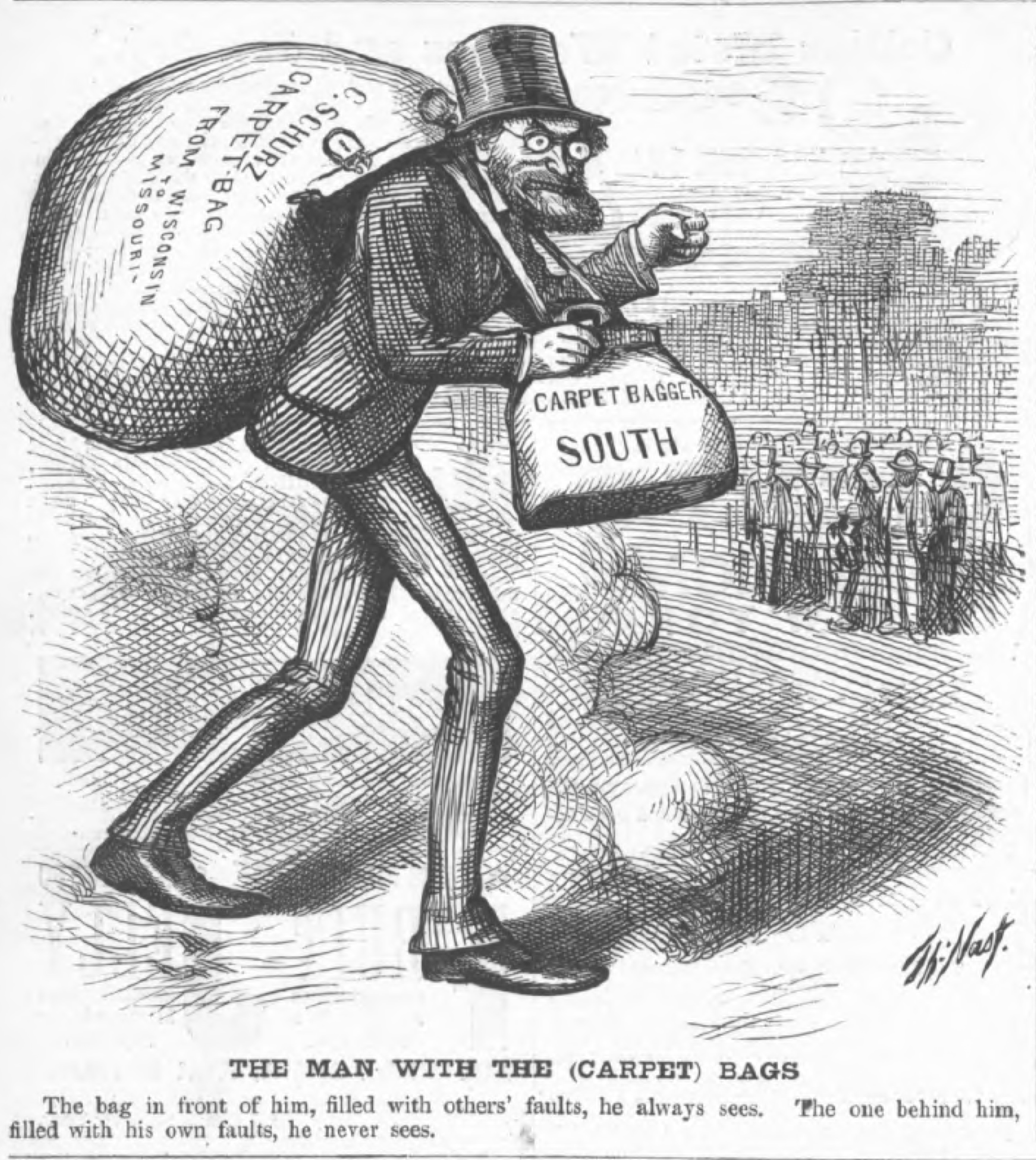The period of time following the American Civil War, although peaceful in terms of gunshots, did not see an end in the conflict regarding the social status of blacks. The Reconstruction era of 1865-1877 denoted an attempt of reuniting the Confederacy with the Union while simultaneously incorporating the rights of freedmen into American society. During this time, America saw a rise to not only familiar titles such as Civil Rights Acts, Black Codes, and Race Riots but also slightly eccentric ones such as Carpetbaggers and Scalawags. What led to the rise of these names that seem to have been just a random assortment of English letters? And how did they factor into the events of American Reconstruction?
 Immediately after the Civil War, the South still possessed a primarily agrarian society, and due to the costs of war, it was left economically ruined. During such a time, many Northerners, carrying their belongings in "carpet bags" traveled south with varying motivations. To many Northerners, these people were educated middle-class schoolteachers and religious missionaries who hoped to influence social reform in Union-controlled southern territory. Several were "agents of the federal Freedmen's Bureau" who sought to support newly emancipated slaves through the establishment of schools by bringing greater education opportunities to the "mostly illiterate black population." Others were volunteers who wanted to contribute to the renovation of destroyed southern railroads. Some even succeeded in holding government position in the House and Representatives and the Senate. To the Southerners, however, these people were portrayed as "insidious Northern outsiders...who attempted to meddle with, and control, Southern politics." They focus their distaste for these people around those who desired to take advantage of the feeble economy of the South. Despite these contrasting views, a majority of carpetbaggers did come to the South with the hopes of making "easy money" through investment in cheap land and low labor prices for black freedmen. In consideration of both sides, while some carpetbaggers were interested in personal gains, others greatly helped the southern economy and status of black freedmen.
Immediately after the Civil War, the South still possessed a primarily agrarian society, and due to the costs of war, it was left economically ruined. During such a time, many Northerners, carrying their belongings in "carpet bags" traveled south with varying motivations. To many Northerners, these people were educated middle-class schoolteachers and religious missionaries who hoped to influence social reform in Union-controlled southern territory. Several were "agents of the federal Freedmen's Bureau" who sought to support newly emancipated slaves through the establishment of schools by bringing greater education opportunities to the "mostly illiterate black population." Others were volunteers who wanted to contribute to the renovation of destroyed southern railroads. Some even succeeded in holding government position in the House and Representatives and the Senate. To the Southerners, however, these people were portrayed as "insidious Northern outsiders...who attempted to meddle with, and control, Southern politics." They focus their distaste for these people around those who desired to take advantage of the feeble economy of the South. Despite these contrasting views, a majority of carpetbaggers did come to the South with the hopes of making "easy money" through investment in cheap land and low labor prices for black freedmen. In consideration of both sides, while some carpetbaggers were interested in personal gains, others greatly helped the southern economy and status of black freedmen.Scalawags, on the other hand, denoted Southerners who supported the efforts of Reconstruction and the political views of the Northern Republican Party. In the vernacular of many Southerners, however, the term "scalawags" was used with the same connotation as that of "traitor," labeling people as "financially and politically corrupt" by Southern Democrats. During their time in the American South, scalawags sided with freedmen, Northerners, and even carpetbaggers with the hopes of influencing state and local governments. They believed that the "civil and political rights" of blacks should be recognized by whites who still maintained control of "political and economic life." They utilized the Reconstruction laws of 1867 as well as the Ironclad Oath (an oath that required government officials to vow that "they had never supported the Confederacy") to limit the political power of former Confederate soldiers and supporters.
Taken together, the carpetbaggers and scalawags had a major political and economic impact upon the post-Civil War economy of the American South. They were responsible for the rise of the Republican party in the South and the funneling of more capital into the South's "staggering economies." However, it should not be overlooked that these people also were responsible for an agglomeration of debt in certain sectors of the southern economy due to exploitation. Nevertheless, the carpetbaggers and scalawags, aligning with some of the goals of reconstruction, also made great contributions towards black education opportunities, freedmen's voting rights, and the destroyed railroads and infrastructures during the civil war.
Source:
https://courses.lumenlearning.com/boundless-ushistory/chapter/the-south-after-reconstruction/
https://www.history.com/topics/american-civil-war/carpetbaggers-and-scalawags
https://prezi.com/qc-txxopsx-k/what-roles-did-carpetbaggers-have-during-reconstruction/
I really liked your post and thought it was well written. Before reading your post, I had the idea that all carpetbaggers and scalawags were bad for the economy and the people, which isn't necessarily true. I think you did a good job showing both sides of the situation. An example of this is how you described carpetbaggers from the Northern POV but then described them from the South's POV.Both sides saw them remarkably differently and how they were changing the economy during Reconstruction. Your post also made me realize that when carpetbaggers and scalawags are discussed, we see posters of them depicted as evil and greedy, which wasn't always the case. (meaning that they are most likely created in the South).
ReplyDelete